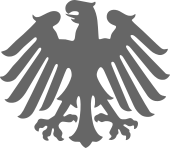Federal Council (Germany)
|
German Bundesrat Deutscher Bundesrat |
|
|---|---|
 |
|
| History | |
| Founded | 23 May 1949 |
| Leadership | |
|
First Vice President
|
Malu Dreyer, SPD
Since 1 November 2017 |
|
Second Vice President
|
|
| Structure | |
| Seats | 69 |
 |
|
|
Political groups
|
Government* (22) Neutral (47) Opposition (0) *currently CDU/CSU/SPD |
| Meeting place | |
 |
|
| Former Prussian House of Lords building, Berlin | |
| Website | |
| Bundesrat | |
The German Bundesrat (literally "Federal Council"; pronounced [ˈbʊndəsʁaːt]) is a legislative body that represents the sixteen Länder (federated states) of Germany at the national level. The Bundesrat meets at the former Prussian House of Lords in Berlin. Its second seat is located in the former West German capital of Bonn.
The Bundesrat participates in legislation, alongside the Bundestag, the directly elected representation of the people of Germany, with laws affecting state competences and all constitutional changes requiring the consent of the body. For its similar function, it is sometimes described as an upper house of parliament along the lines of the US Senate, the Canadian Senate or the British House of Lords.
Bundesrath (from 1901 on: Bundesrat, according to a general spelling reform) was the name of similar bodies in the North German Confederation (1867) and the German Empire (1871). Its predecessor in the Weimar Republic (1919–1933) was the Reichsrat.
The political makeup of the Bundesrat is affected by changes in power in the states of Germany, and thus by elections in each state. Each state delegation in the Bundesrat is essentially a representation of the state government and reflects the political makeup of the ruling majority or plurality of each state legislature (including coalitions).
The German Bundesrat was first founded, together with the North German Confederation, in 1867. It was continued under the same name and with the same functions by the German Empire, in 1871. Under the Weimar Constitution, 1919, it was replaced by the Reichsrat (1919–1934).
...
Wikipedia
